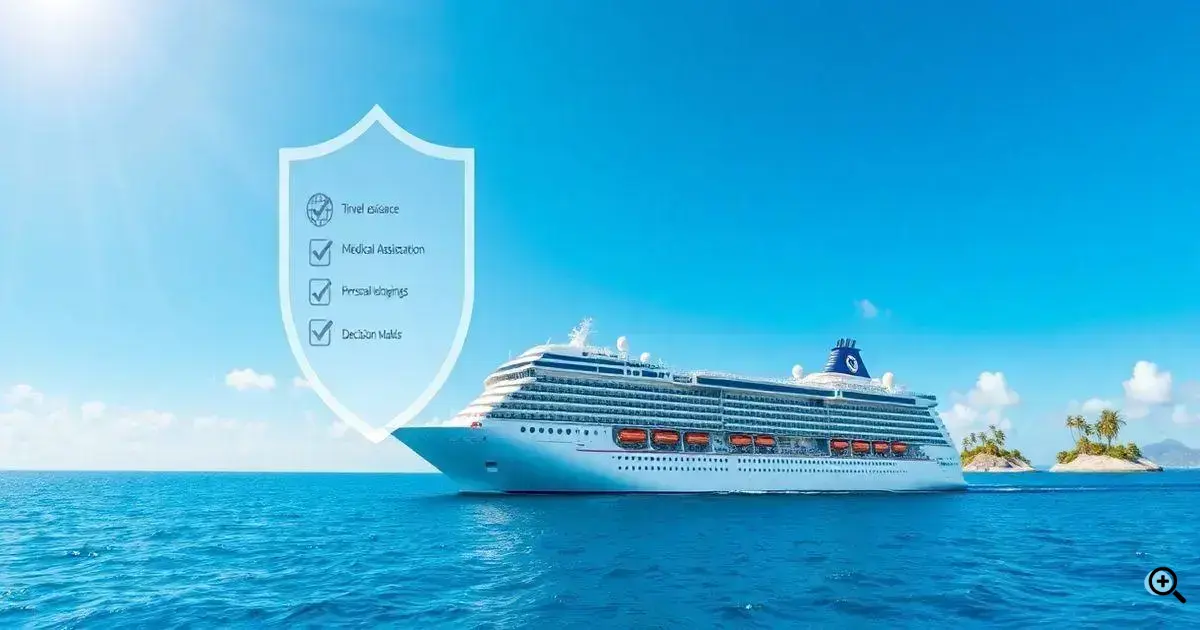Contents
- 1 Understanding Cruise Travel Insurance
- 2 Types of Coverage Offered
- 3 Reasons to Consider Insurance
- 4 When It May Not Be Necessary
- 5 How to Choose the Right Policy
- 6 Frequently Asked Questions
- 7 Frequently Asked Questions about Cruise Travel Insurance
- 7.1 What is cruise travel insurance?
- 7.2 Is cruise travel insurance necessary?
- 7.3 Does my health insurance cover me while on a cruise?
- 7.4 Can I purchase insurance after I’ve booked my cruise?
- 7.5 What should I look for in a cruise travel insurance policy?
- 7.6 What is a ‘Cancel for Any Reason’ policy?
- 7.7 Are there any exclusions I should be aware of?
- 7.8 How do I file a claim?
Cruise travel insurance is crucial for protecting against risks like trip cancellations, medical emergencies, and lost luggage during cruises. It offers peace of mind and financial security, especially given the unique aspects of cruise vacations. Key coverage types include trip cancellation, medical expenses, and baggage loss. While it may not be necessary for everyone, understanding your needs and comparing policies is essential for selecting the right insurance.
Planning a cruise can be an exciting adventure, but it also comes with unique risks that can impact your experience. As you prepare for your next voyage, you may wonder if purchasing cruise travel insurance is a wise decision. This article delves into the necessity of cruise travel insurance, covering key aspects that can help you make an informed choice. Whether you’re cruising to a tropical paradise or exploring new cities, understanding the benefits and coverage options of travel insurance is crucial to safeguarding your trip.
Understanding Cruise Travel Insurance
Cruise travel insurance is a specialized type of travel insurance designed to cover travelers embarking on cruise vacations. Unlike regular travel insurance, which may cover general travel-related risks, cruise travel insurance specifically addresses the unique challenges faced during a cruise journey.
Importance: Cruises involve various activities and destinations, making them distinct from typical travel scenarios. These trips often include pre- and post-cruise travel arrangements, multiple ports of call, and numerous onboard activities. Therefore, having tailored insurance can help mitigate potential risks.
Risk Factors:
- Weather-related disruptions that could delay or cancel ports of call.
- Medical emergencies that may occur onboard where access to facilities might be limited.
- Coverage for missed connections or cancellations, particularly with tight travel schedules.
Differences from Regular Insurance: While regular travel insurance may provide basic coverage for trip cancellations and lost belongings, cruise travel insurance offers additional protections specific to the cruising experience. For example, it often includes options for trip interruption due to missed ports and coverage for medical evacuations while at sea.
Key Features:
- Trip Cancellation and Interruption: Reimburses travelers for non-refundable expenses if they must cancel or interrupt their cruise due to covered reasons.
- Medical Coverage: Provides emergency medical coverage, which is essential since some health insurance plans may not cover medical costs incurred while at sea.
- Baggage Loss or Delay: Offers compensation for lost or delayed luggage, ensuring you have access to essentials during your trip.
- Emergency Evacuation: Covers evacuation costs in case of a medical emergency that requires immediate transport to a suitable medical facility.
Types of Coverage Offered

Cruise travel insurance provides a range of coverage options designed to protect travelers against various risks associated with cruise vacations. Understanding the types of coverage can help you select a policy that best suits your needs.
Types of Coverage Offered:
Trip Cancellation
Reimburses you for non-refundable expenses if you need to cancel your cruise due to unforeseen events, such as illness, injury, or death in the family.
Trip Interruption
Covers costs if you need to cut your trip short due to emergency situations. This may include return airfare and any prepaid non-refundable trip costs.
Medical Expenses
Provides coverage for medical emergencies that occur while on the cruise. This is particularly important as many standard health insurance plans offer limited or no coverage outside of the country.
Emergency Evacuation
Covers the cost of transportation to the nearest appropriate medical facility in case of a medical emergency during the cruise.
Baggage Loss or Delay
Offers compensation for your luggage if it is lost, stolen, or delayed, ensuring you have access to essential items during your trip.
Missed Connection
Provides coverage for additional transportation or accommodation costs if you miss a scheduled departure due to delays in arrival at the cruise port.
Port Coverage
Includes specific protections relating to missed ports due to weather or other disruptions. This can help reimburse costs for missed excursions or activities.
Cancel for Any Reason
An optional add-on that allows travelers to cancel their trip for reasons not typically covered by standard cancellation policies, often reimbursing a portion of the prepaid costs.
Understanding the various types of coverage offered by cruise travel insurance is essential for protecting your trip investment. Evaluating the different options can help ensure you choose a policy that provides the necessary safeguards for your cruise experience.
Reasons to Consider Insurance
Traveling on a cruise can be a once-in-a-lifetime experience filled with adventure and relaxation. However, as with any travel plans, unforeseen events can occur. Here are several compelling reasons to consider cruise travel insurance for your journey.
Protection Against Trip Cancellations: Unexpected circumstances, such as illness, family emergencies, or natural disasters, can force you to cancel your cruise. Travel insurance can protect your investment by reimbursing non-refundable payments.
Medical Emergencies: Health risks can arise while traveling, and many cruise lines do not provide adequate medical insurance. Coverage can help with costly medical bills, emergency treatments, and evacuation if required.
Loss or Delay of Baggage: Luggage can be lost or delayed during travel, which can disrupt your cruise experience. Insurance can help reimburse you for essential items until your baggage is recovered.
Travel Delays and Missed Connections:
If your travel plans are affected by delays or disruptions, travel insurance can provide coverage for additional accommodations or transportation, ensuring you can catch your cruise.
Coverage for Specific Cruise Risks: Cruises uniquely present risks related to missing ports due to weather changes or other operational decisions. Insurance can defend against financial losses related to these situations.
Peace of Mind: Having cruise travel insurance allows you to relax and enjoy your vacation knowing you’re protected against unexpected events. This peace of mind can enhance your overall travel experience.
Considering the potential risks and uncertainties of cruise travel, obtaining travel insurance is a prudent choice. It not only safeguards your financial investment but also allows you to enjoy your journey with greater confidence and security.
When It May Not Be Necessary

While cruise travel insurance offers numerous benefits for many travelers, there are situations where it may not be necessary. Understanding these instances can help you make an informed decision about whether to invest in a policy.
No Significant Financial Investment: If your cruise plans involve minimal non-refundable expenses, the cost of insurance may outweigh the risks. For example, if you have only paid a small deposit or are traveling on a budget.
Pre-Existing Conditions Covered by Health Insurance: If you have a reliable health insurance plan that provides coverage while traveling and covers specific pre-existing conditions, you might not need additional medical coverage through travel insurance.
Flexible Travel Arrangements: If you booked a cruise with flexible cancellation policies or you can easily reschedule travel plans, you may find that the cost of insurance isn’t justified.
Traveling with a Group with Shared Resources: When traveling as part of a large group with shared accommodations and resources, the risk of individual financial loss may be mitigated, making insurance less essential.
Prior Experience and Planning: If you’re an experienced cruiser familiar with potential risks, and you’ve planned the trip with contingencies (such as understanding the medical facilities available), you may feel comfortable forgoing insurance.
Full Coverage Through Other Policies: If you already have comprehensive travel insurance that covers many typical risks associated with cruises, additional coverage may not be necessary.
Deciding whether or not to purchase cruise travel insurance depends on individual circumstances and risk tolerance. By evaluating your specific situation, you can determine if securing insurance is worthwhile or if you can confidently navigate your cruise without it.
How to Choose the Right Policy
Selecting the right cruise travel insurance policy is crucial to ensure that you are adequately protected during your vacation. With various options available, here’s a guide to help you make an informed choice.
Assess Your Coverage Needs: Evaluate the specific risks associated with your cruise. Consider factors such as your health, the destinations you will visit, and the amount invested in non-refundable expenses to determine the coverage you need.
Understand the Policy Details: Read the fine print carefully. Review the coverage limits, exclusions, and conditions of the policy. Ensure you are comfortable with any deductibles or waiting periods.
Compare Policies: Use online comparison tools to review various policies side by side. Take note of pricing, coverage features, and customer reviews to find the best match for your needs.
Check for Pre-Existing Condition Coverage: If you have pre-existing medical conditions, look for policies that offer coverage or a waiver for these conditions. This is crucial in protecting yourself from high medical expenses due to unforeseen health issues.
Consider Additional Coverage Options: Evaluate whether you need optional add-ons such as ‘Cancel for Any Reason’ coverage or specific protections for adventure activities if you plan to partake in excursions.
Review Customer Support and Claims Process: Research how the insurance provider handles customer support and claims. Look for a company with a reputation for strong customer service and a straightforward claims process.
Seek Recommendations: Ask for recommendations from friends, family, or travel agents who have experience with cruise travel insurance. They can provide valuable insights about reliable providers and policies.
Choosing the right cruise travel insurance policy requires careful consideration of your specific needs, thorough research, and comparison of available options. By following these steps, you can select a policy that will provide peace of mind and protection during your cruise adventure.
Frequently Asked Questions

Many travelers have questions about cruise travel insurance. Here are some frequently asked questions along with their answers to help you understand this important topic better.
What is cruise travel insurance? Cruise travel insurance is a specialized type of travel insurance designed to cover specific risks associated with cruising. It typically includes coverage for trip cancellations, medical emergencies, lost luggage, and other travel-related incidents.
Is cruise travel insurance necessary? While it’s not mandatory, cruise travel insurance is strongly recommended to protect your financial investment and provide peace of mind in case of unforeseen events or emergencies.
Does my health insurance cover me while on a cruise? Many health insurance policies do not extend coverage while traveling outside your home country or onboard a cruise ship. It’s essential to check with your provider and consider obtaining separate travel insurance for medical emergencies.
Can I purchase insurance after I’ve booked my cruise? Yes, you can purchase cruise travel insurance after booking your cruise. However, it’s best to buy it as soon as possible to ensure coverage for unforeseen cancellations or medical issues that may arise before your trip.
What should I look for in a cruise travel insurance policy? Look for coverage that includes trip cancellation and interruption, medical expenses, emergency evacuation, baggage loss, and any specific protections relevant to your planned activities or destinations.
What is a ‘Cancel for Any Reason’ policy? ‘Cancel for Any Reason’ (CFAR) insurance allows you to cancel your trip for reasons not typically covered by standard policies and receive a partial refund. This option may provide extra flexibility if your plans change.
Are there any exclusions I should be aware of? Yes, most insurance policies include exclusions, such as pre-existing medical conditions, acts of war, or situations resulting from alcohol or drug use. It’s vital to read the policy’s terms and conditions carefully.
How do I file a claim? To file a claim, contact your insurance provider as soon as possible after the incident occurs. You will usually need to provide documentation such as receipts, medical reports, and any relevant evidence to support your claim.
Understanding these frequently asked questions can help clarify your concerns about cruise travel insurance. If you have additional questions, it’s recommended to reach out to your insurance provider for specific inquiries related to your policy.
Navigating the world of cruise travel insurance can be complex, but understanding its importance and benefits is crucial for a successful and worry-free vacation.
From ensuring you’re protected against unexpected cancellations and medical emergencies to finding the right policy tailored to your needs, proper preparation is key.
Key Takeaways
Cruise travel insurance is designed to cover specific risks associated with cruising, making it a valuable investment for travelers.
Assessing your individual needs and understanding the types of coverage available are essential steps in choosing the right policy.
While there are situations where travel insurance may not be necessary, considering the potential risks of cruising often justifies the cost.
Being informed about common questions and concerns regarding cruise insurance can help you make better decisions.
Final Advice: Before setting sail, take the time to research and evaluate your travel insurance options. By ensuring that you have the right coverage, you can focus on enjoying your cruise and creating lasting memories with peace of mind.
Frequently Asked Questions about Cruise Travel Insurance
What is cruise travel insurance?
Cruise travel insurance is a specialized type of travel insurance designed to cover specific risks associated with cruising, including trip cancellations, medical emergencies, lost luggage, and more.
Is cruise travel insurance necessary?
While it’s not mandatory, cruise travel insurance is highly recommended to protect your financial investment and provide peace of mind in case of unforeseen events.
Does my health insurance cover me while on a cruise?
Many health insurance policies do not extend coverage while traveling outside your home country or onboard a cruise ship. It’s essential to check with your provider and consider obtaining separate travel insurance.
Can I purchase insurance after I’ve booked my cruise?
Yes, you can purchase cruise travel insurance after booking your cruise. However, it’s best to buy it promptly to ensure coverage for unforeseen cancellations or medical issues that may arise before your trip.
What should I look for in a cruise travel insurance policy?
Look for coverage that includes trip cancellation and interruption, medical expenses, emergency evacuation, baggage loss, and any specific protections relevant to your planned activities or destinations.
What is a ‘Cancel for Any Reason’ policy?
‘Cancel for Any Reason’ (CFAR) insurance allows you to cancel your trip for reasons not typically covered by standard policies and receive a partial refund, providing extra flexibility if your plans change.
Are there any exclusions I should be aware of?
Yes, most insurance policies include exclusions, such as pre-existing medical conditions, acts of war, or situations resulting from alcohol or drug use. It’s vital to read the policy’s terms and conditions carefully.
How do I file a claim?
To file a claim, contact your insurance provider as soon as possible after the incident occurs. You’ll typically need to provide documentation such as receipts, medical reports, and any relevant evidence to support your claim.







